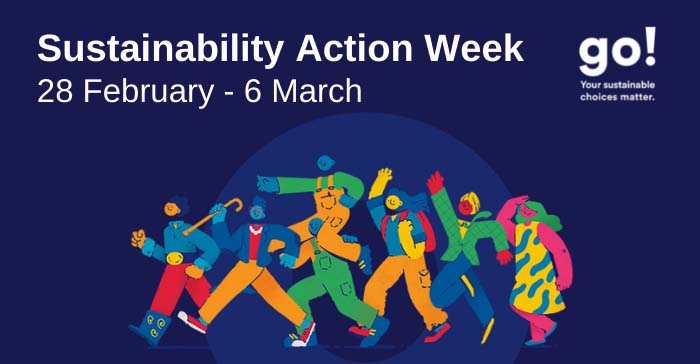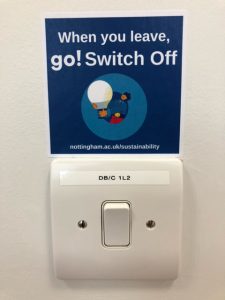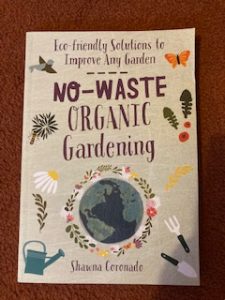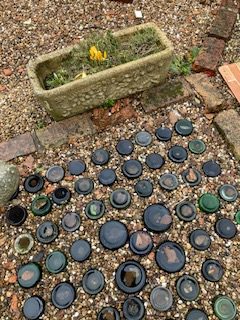
March 5, 2022, by Ryan Neal
The Sustainability Challenge – day five
In celebration of Sustainability Action Week, we’ve challenged two of our senior leaders – Andy Nolan, Director of Development and Sustainability; and Professor Sarah Speight, Pro-Vice-Chancellor for Education and Student Experience – to spend the week living as sustainably as possible. Each day they will be chronicling their experience and sharing some tips so make sure you check back regularly.
Andy
What a busy week – it’s been great to focus on my personal sustainability whilst I go about my work here at the university and from home. That focus has helped me, personally, up my game this week. I’ve stuck to a meat-free week, I’ve actively chosen to shop local and buy local products in local shops with, wherever possible, reduced packaging. I’ve walked more – noticeably more on days I have commuted and – note to self – I’ve been a lot less active when working from home. Must do better.
Taking personal responsibility is the key message I wanted to leave you with at the end of this week. Talking to Sarah earlier, we’ve agreed that we can do more and it feels good to do the right thing. But that can take a bit more time and effort to organise. We’re living in a society that promotes convenience. If you haven’t planned something for dinner, don’t worry – the supermarket has shelves full of ready meals wrapped in plastic. Convenience has come at a cost to the planet. Without wishing to sound like an old grumpy fella, when I was growing up there were no such things as Starbucks or Costa. If you were in town and wanted a coffee you had to sit down and have it in a proper cup. Now you can decide almost on the spot whether you want a coffee and there’ll be all manner of variations that can be served to you in a plastic lined paper cup. That’s why we created the WasteNott campaign 4 years ago to promote re-usable cups. I bring both a water bottle and a flask to campus now so I can avoid consuming paper cups.
 We can all do something – it’s important we don’t leave it all to others to do it for us. I was reminded of this when I was working in one of the Professional Services hubs on University Park today. Above the light switch was a sticker reminding people to turn off the light when they’d finished using the room. I see lights left on, windows left open across our estate, and I would urge everyone to take some personal responsibility and turn them off and close them.
We can all do something – it’s important we don’t leave it all to others to do it for us. I was reminded of this when I was working in one of the Professional Services hubs on University Park today. Above the light switch was a sticker reminding people to turn off the light when they’d finished using the room. I see lights left on, windows left open across our estate, and I would urge everyone to take some personal responsibility and turn them off and close them.
There are plenty of other choices we can all take each day that can make a big difference:
- The food we eat – if you’re ordering delivered catering for a meeting you can order vegetarian or vegan food with a lower environmental impact
- The paper we print on – did you know that as a result of the pandemic and homeworking we’ve seen around an 80% reduction in the paper consumption in printers on campus?
- The way we travel – why not walk, cycle or take public transport as opposed to the car on your commute to campus? When on business travel choose the train over flying if you can.
In fact, food, paper and travel are three of the top four contributors to the university’s scope three emissions (scope three emissions account for around 160,000 tonnes of CO2 each year in comparison to emissions from electricity and gas). I would urge you to think about what you can do but to help you we’ve put together a useful guide.
Thank you to all of you who’ve read our blogs and tweets and posts this week – we’ve enjoyed the feedback you’ve provided and the follow-up emails you’ve sent! Finally, a big thank you to the team behind the week – particularly Ally and Rachel who’ve been at the heart of it all – but thank you to everyone who’s put on a talk, set up a display or attended any one of the sessions so far. More lined up for the weekend – do get involved. More info at www.nottingham.ac.uk/sustainability.
Sarah
Reflections on the week
Andy’s role at the university requires him to be a leader on environmental sustainability – it’s in his job title. Sustainability isn’t in my job title, but I do feel both a personal and professional responsibility to promote sustainable behaviours. I feel a moral obligation to current and future generations, and to the flora and fauna with which we share our planet. In case this sounds like hard work, I don’t think it is. I connect sustainability with my health and my happiness – I enjoy trying to live sustainably. It’s not about stopping things or giving them up; it’s about living a good life. That’s why I accepted the challenge to join Andy this week. I thought it was about time I upped my game – and I do love a challenge!
When I first worked on sustainability at the university, it was through my undergraduate teaching. My disciplinary background is in history and archaeology, and I used to teach about the relationships between people and the environment in the past, including the origins of agriculture in ancient Mesopotamia, the contribution of resource imbalances to human slavery, and the effects of climate change (eg the so-called ‘Little Ice Age’ of the medieval period). My understanding of sustainability changed as my roles changed and I started to think about sustainability increasingly in terms of values and behaviours – our attitudes towards equality and opportunity, and our abilities as individuals and communities to be proactive in our relationships with the world around us in order to achieve nourishment, balance and longevity (all terms that are used in dictionary definitions of sustainability).
So how have I upped my game this week? I have:
- Cut meat from my diet completely – and not missed it.
- Used only public transport to get to work (four days, a marginal increase).
- Conserved energy at home (turning off lights, turning the heating down a little, shorter showers).
- Used a zero-waste shop for the first time (and intend to turn this into a habit).
- Consciously planned ahead to make more sustainable choices (eg food preparation and use of seasonal or preserved foods, printing).
 It doesn’t sound very much, but I’ve ‘refreshed’ my personal commitments. And today, just as the challenge ends, I’ve been inspired. I called into the bookshop in the Portland Building and treated myself to ‘No-Waste Organic Gardening’ by Shawna Coronado. You may laugh, but Shawna suggests an approach to growing tomatoes that I’ve never come across before – laying them on their sides in a trench so that the side roots are in direct contact with moisture and nutrients. This is my ‘light-bulb’ moment of the week – it could be a great way to conserve water and reduce the need for hand-watering. I sowed some tomato seeds in a propagator last weekend and, less than seven days later, I have seedlings. Shawna also has an idea for using (empty) wine bottles to create the edging for a garden path or bed. I have a wine bottle feature in my garden already (created by the previous occupants) but I’m now thinking of how else I could upcycle glass.
It doesn’t sound very much, but I’ve ‘refreshed’ my personal commitments. And today, just as the challenge ends, I’ve been inspired. I called into the bookshop in the Portland Building and treated myself to ‘No-Waste Organic Gardening’ by Shawna Coronado. You may laugh, but Shawna suggests an approach to growing tomatoes that I’ve never come across before – laying them on their sides in a trench so that the side roots are in direct contact with moisture and nutrients. This is my ‘light-bulb’ moment of the week – it could be a great way to conserve water and reduce the need for hand-watering. I sowed some tomato seeds in a propagator last weekend and, less than seven days later, I have seedlings. Shawna also has an idea for using (empty) wine bottles to create the edging for a garden path or bed. I have a wine bottle feature in my garden already (created by the previous occupants) but I’m now thinking of how else I could upcycle glass.
 Like Andy, I have a home office setup as a result of the pandemic. Mine is on the ground floor looking out onto the street. I’ve had a few amusing incidents over the past two years when I’ve been distracted from a Teams meeting by what’s going on outside. I remember getting very excited as some fox cubs ran up and down the road in spring 2020, and I have hurriedly left meetings to go and recover wheelie bins blown down the street in a gale on more than one occasion. I’ve had a neighbour knock on the window to offer me homemade baklava as I chair a committee – my neighbour is Greek (very convenient for me as I’m learning the language). And I can’t count the number of times my cats have crawled over me in front of my colleagues.
Like Andy, I have a home office setup as a result of the pandemic. Mine is on the ground floor looking out onto the street. I’ve had a few amusing incidents over the past two years when I’ve been distracted from a Teams meeting by what’s going on outside. I remember getting very excited as some fox cubs ran up and down the road in spring 2020, and I have hurriedly left meetings to go and recover wheelie bins blown down the street in a gale on more than one occasion. I’ve had a neighbour knock on the window to offer me homemade baklava as I chair a committee – my neighbour is Greek (very convenient for me as I’m learning the language). And I can’t count the number of times my cats have crawled over me in front of my colleagues.
Returning to my professional life, this week has been packed full of meetings on a huge range of subjects. Like many colleagues, both staff and students, I’ve had the logistical challenge of transporting myself between virtual and physical meeting rooms in the shortest possible time. I think it is going to take a few months to get the balance right and to have travel time built back into our working days – ideally mental, as well as physical, travel time.
I hope you’ve enjoyed Andy’s and my blog posts this week – Thursday’s footage of badgers and foxes in Andy’s Sheffield garden was my favourite. We’ve tried to write about what we do as well as what we think, to share some ideas, and to demonstrate how important sustainability is to us and to the university – irrespective of whether or not it features in our job title. Thank you for reading.
Find out how Andy and Sarah got on on day one, day two, day three and day four.
No comments yet, fill out a comment to be the first

Leave a Reply